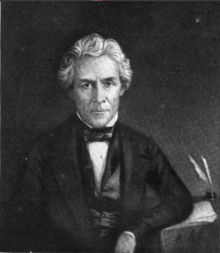John Bouvier
| John Bouvier | |
|---|---|

John Bouvier
|
|
| Born | 1787 Codognan, France |
| Died | November 18, 1851 Philadelphia, Pennsylvania |
| Residence | United States |
| Citizenship | United States |
John Bouvier (1787–November 18, 1851), a French-born American jurist and legal lexicographer, is known for his legal writings, particularly his Law Dictionary Adapted to the Constitution and Laws of the United States of America and of the Several States of the American Union (1839). It is believed to be the first legal dictionary to be based on American law, and is still in publication. It has been frequently revised and republished, and was retitled Bouvier's Law Dictionary in 1897. Bouvier also published The Institutes of American Law (1851) and an edition of Matthew Bacon's Abridgment of the Law.
John Bouvier was born in 1787 in Codognan, France, in the department du Gard, to Jean Bouvier (1760-1803) and Marie Benezet (1760-1823). They were members of the Quakers. John Bouvier was educated in Nimes.
In 1802, Jean and Marie Bouvier, John Bouvier, and his brother Daniel emigrated to America and settled in Philadelphia. Bouvier's father died within a year of yellow fever, and his mother later returned to France. John Bouvier was apprenticed to age 21 to a Philadelphia Quaker, Benjamin Johnson, a printer and bookseller who had known the family while traveling in France.
In 1808, John Bouvier began a printing business on Cypress Alley in west Philadelphia. In 1810, he married Elizabeth Widdifield (1789-1870), by whom he had one daughter, astronomical writer and cookbook author Hannah Mary Bouvier Peterson (1811-1870). Bouvier became a citizen of the United States in 1812.
By 1814, Bouvier was living in Brownsville, Pennsylvania, where on Wednesday, November 9, 1814, he published the first issue of The American Telegraph. In the weekly newspaper, he resolved to "discountenance factions and factious men" while following an editor's duty of "exposure and support of the truth". In 1818, Bouvier moved to Uniontown, Pennsylvania where he joined with another periodical to publish The Genius of Liberty and American Telegraph. He continued to be involved in its publication until July 18, 1820.
...
Wikipedia
